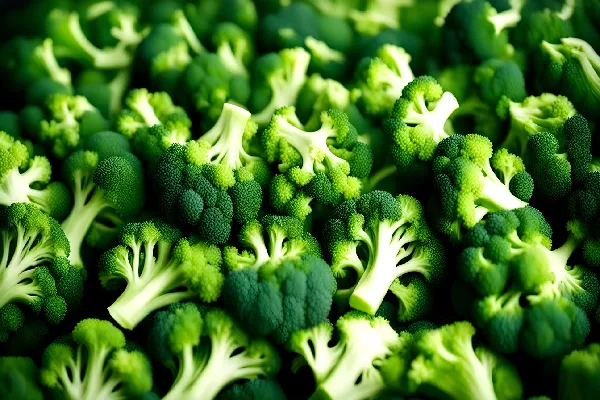When it comes to promoting good health through nutrition “Broccoli” scientifically known as Brassica oleracea plays a very important role in our diet.
In this post, we will explore the remarkable health benefits of broccoli and look into its potential pros and cons.
Table of Contents
Understanding the Health Benefits of Broccoli by its Nutritional Power

Before we dive into the many health advantages of broccoli and potential concerns, it’s important to understand its nutritional content.
Broccoli is a low-calorie, nutrient-dense vegetable that’s packed with essential vitamins, minerals, and antioxidants.
A one-cup serving of cooked broccoli (approximately 91 grams) provides:
Carbohydrates: 11 grams
Protein: 5 grams
Fibre: 5 grams
Vitamin C: 135% of the Recommended Daily Intake (RDI)
Vitamin A: 11% of the RDI
Vitamin K: 100 micrograms, or 276% of the daily requirement
Vitamin B9 (Folate): 168 micrograms, or 42% of the daily requirements
Potassium: 457 milligrams, or 14% of the daily requirements
Phosphorus: 105 milligrams, or 10% of the daily requirements
Manganese: 0.4 milligrams, or 16% of the daily requirement
Magnesium: 33 milligrams, or 8% of the daily requirement
Calcium: 62 milligrams, or 6% of the daily requirement
Broccoli also contains just 25 calories, a minimal amount of carbohydrates, no fat, and a modest amount of plant-based protein.
Broccoli’s Impressive Health Benefits

- Fibre for Digestive Health
Broccoli is rich in dietary fibre, providing approximately 5 grams of fibre per cup.
Fibre is known for supporting healthy digestion, curbing hunger, and stabilizing blood sugar levels.
It also plays a role in heart health by helping lower cholesterol levels.
- Hydration Booster
Broccoli is not just nutritious but hydrating too.
A single cup of raw broccoli contains about 68 grams of water, contributing to overall hydration.
Proper hydration is essential for maintaining healthy cells, regulating body temperature, lubricating joints, and preventing constipation.
- Cancer Prevention
Broccoli belongs to the cruciferous vegetable family, which includes cauliflower, kale, Brussels sprouts, and others.
This family of vegetables contains natural compounds that have been linked to cancer prevention.
These compounds can neutralize carcinogens and inhibit the growth and spread of cancer cells.
Cruciferous vegetables also support apoptosis, the body’s natural process of eliminating dysfunctional cells.
- Heart Protection
Heart disease remains a leading cause of mortality.
Research has shown that cruciferous vegetables, like broccoli, play a role in protecting the heart.
They reduce damage to arteries, helping to prevent the hardening that can lead to heart attacks and strokes.
- Brain Health Enhancement
Broccoli contains pigments such as lutein and zeaxanthin, known for their brain-boosting benefits.
These pigments support healthy brain and nervous tissue function and protect against age-related cognitive decline.
- Bone Strength
Just like other Green Vegetables Your bones also benefits from the nutrients in broccoli
It’s rich in essential nutrients for bone formation and the prevention of bone density loss, including vitamin K, magnesium, phosphorus, calcium, copper, zinc, and vitamin C.
- Anti-Inflammatory Power
The anti-inflammatory properties of broccoli are linked to a reduced risk of chronic diseases.
Studies have shown that a higher intake of cruciferous vegetables can help lower levels of pro-inflammatory markers circulating in the blood.
- Protective Antioxidants
Broccoli contains natural compounds that act as detoxifiers, helping to deactivate potentially harmful chemicals and eliminate them from the body.
These protective antioxidants are beneficial for countering skin damage from UV radiation and safeguarding the eyes from conditions like macular degeneration and cataracts.
Potential Pros and Cons of Broccoli

Pros:
- Cancer Prevention
Broccoli is packed with unique compounds, including glucosinolates, that have powerful anti-cancer properties.
These compounds are known to inhibit the growth of cancer cells and trigger their self-destruction, a process called apoptosis.
Studies have shown that a high intake of cruciferous vegetables like broccoli can significantly reduce the risk of various types of cancer, including breast, prostate, colorectal, gastric, renal, and bladder cancers.
- Heart Health
Your heart will thank you for including broccoli in your diet.
Sulforaphane, a compound found in broccoli, has been linked to cardiovascular health.
It reduces inflammation, lowers blood pressure, and even thins the blood, reducing the risk of heart disease.
Moreover, broccoli can lower homocysteine levels in the body, reducing the risk of artery hardening.
- Brain Boost
For those concerned about cognitive health, broccoli is a fantastic addition to your meals.
It contains nutrients like kaempferol and Sulforaphane, which have been associated with healthy brain function and nervous tissue.
- Bone Density
Broccoli contributes to stronger bones by providing essential nutrients like vitamin K, magnesium, calcium, and others, all of which are crucial for bone health.
- Anti-Inflammatory
Chronic inflammation is at the root of many diseases.
Broccoli’s anti-inflammatory properties are invaluable for reducing the risk of conditions like type 2 diabetes, rheumatoid arthritis, inflammatory skin issues, obesity, and bowel diseases.
- Detoxification
Your body benefits from broccoli’s ability to detoxify harmful substances.
It contains compounds such as indoles, isothiocyanates, and Sulforaphane, which help deactivate carcinogens and eliminate them from the body.
- Eye Protection
If you’re concerned about your eye health, broccoli should be on your plate.
It’s rich in antioxidants like lutein and zeaxanthin, which protect the retina and lens from age-related damage, reducing the risk of macular degeneration and cataracts.
- Oral Health
Broccoli not only promotes overall health but also contributes to good oral health.
Compounds in broccoli prevent bacteria from adhering to tooth enamel, reducing the risk of cavities and gum disease.
- Menstrual Cramp Relief
Women who suffer from menstrual cramps might find relief by incorporating broccoli into their diet.
Compounds in broccoli block histamine receptors, preventing excessive uterine contractions during menstruation and reducing period pain.
Cons:
- Digestive Discomfort
For some individuals, broccoli can cause gas and bloating.
This is due to the presence of sugars that can be challenging for the stomach and small intestine to digest.
- Allergic Reactions
While uncommon, some people may be allergic to broccoli, resulting in allergic reactions. Symptoms may include itching, swelling, and difficulty breathing.
- Vitamin C Overload
Broccoli is exceptionally rich in vitamin C, but consuming excessive amounts of this vitamin, whether from foods, drinks, or supplements, can lead to digestive side effects like diarrhoea or stomach cramps.
Read More : How to use Spinach for Weight Loss?
Warnings and Precautions
It’s important to note that while broccoli offers a multitude of health benefits, individuals with certain medical conditions or sensitivities should exercise caution.
For instance, if you are prone to kidney stones, consuming too much broccoli may exacerbate the condition due to its oxalate content.
Additionally, people taking blood-thinning medications should be mindful of broccoli’s potential blood-thinning effects, as it could interact with their medication.
For individuals who experience digestive discomfort when consuming broccoli, cooking methods can make a difference.
Overcooking can lead to the loss of important nutrients, so opt for methods like steaming or sautéing to retain the most health benefits while minimizing digestive discomfort.
Final Words

Broccoli, with its wealth of health benefits and remarkable nutritional content.
Its potential to reduce the risk of cancer, enhance heart health, boost brain function, strengthen bones, and combat inflammation is well-documented.
Additionally, broccoli’s detoxifying properties, eye protection, support for oral health, relief from menstrual cramps, and contribution to hydration and weight management make it a versatile and valuable addition to your diet.
However, like any food, broccoli may not be suitable for everyone.
If you experience digestive discomfort or have specific medical conditions, it’s wise to consume it in moderation and explore different cooking methods.
Incorporating broccoli into your daily meals can be an enjoyable and health-conscious choice.
